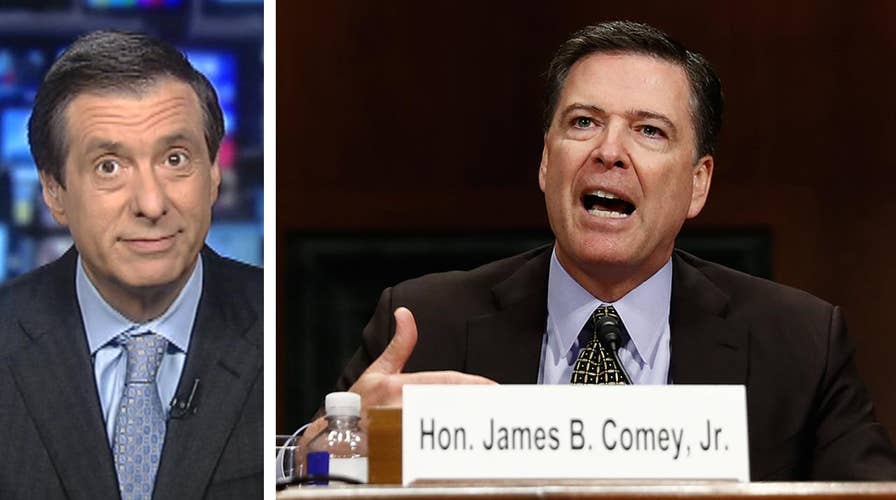Kurtz: Should we feel Jim Comey's pain?
'MediaBuzz' host Howard Kurtz weighs in on FBI Director James Comey's testimony before the Senate Judiciary Committee
James Comey was “mildly nauseous” over the notion that his last-minute disclosure of a renewed Hillary Clinton investigation might have affected the election.
And Clinton’s insistence on blaming Comey (and other outside factors) for her loss is making some of her critics nauseous.
Once again, ladies and gentlemen, we are relitigating the 2016 election.
When the FBI director testified before the Senate Judiciary Committee yesterday, he seemed like a man with months of pent-up frustration over the beating he has been taking. The words came tumbling out.
Having declined to prosecute Clinton over her private emails last summer, Comey said his choice last October was between “really bad and catastrophic” options, once the bureau learned that many Hillary emails were on the computer of Huma Abedin’s husband, the notorious Anthony Weiner.
Comey said he felt a duty to notify the Hill or else he would have committed an “act of concealment.” The probe, of course, went nowhere.
“Lordy, has this been painful. I’ve gotten all kinds of rocks thrown at me and this has been really hard, but I think I’ve done the right thing at each turn.’’ (Comey said he won’t say another “peep” about the investigation of contacts between Trump campaign aides and Russia because it’s still ongoing.)
Clinton, interviewed by CNN’s Christiane Amanpour at the Women for Women forum, admitted she didn’t run a “perfect campaign.” But she could not conjure up a single example of anything she had done wrong.
Instead: “I was on the way to winning until the combination of Jim Comey’s letter on October 28th and Russian Wikileaks raised doubts in the minds of people who were inclined to vote for me but got scared off.”
The evidence for that was “compelling” and “persuasive,” Hillary said, and she endorsed the view of data guru Nate Silver that “if the election had been on October 27th, I’d be your president.”
Clinton also said that misogyny played a role.
And there was this hardball question from Amanpour: “What do you imagine your election as the first female president of the United States might have said to the world and to the women of the world who were looking for validation, for somebody to shatter that highest and hardest ceiling?” Clinton said “it would have been a really big deal.” Uh huh.
In a close race, every factor can be said to have made the difference. Comey's brief re-investigation of the Clinton email mess clearly hurt her by shifting the media focus back to her ethical fitness.
But it was her lack of a core economic message--or any inspiring message other than that she wasn't Trump--that ultimately sunk her.
Remember that the Democrats thought they would easily trounce Trump. But he had something to say to white working-class voters and she didn’t. Her decision to campaign barely or not at all in Michigan and Wisconsin was why she flunked the Electoral College.
President Trump weighed in (of course) on Twitter, faulting Comey’s original decision not to bring charges:
“FBI Director Comey was the best thing that ever happened to Hillary Clinton in that he gave her a free pass for many bad deeds!” And: “Perhaps Trump just ran a great campaign?”
Why does Clinton’s loss still stir such intense debate? Perhaps it’s because these arguments about Comey, Russia and Wikileaks keep reverberating throughout the Trump presidency—in a way that’s making me slightly queasy.





















